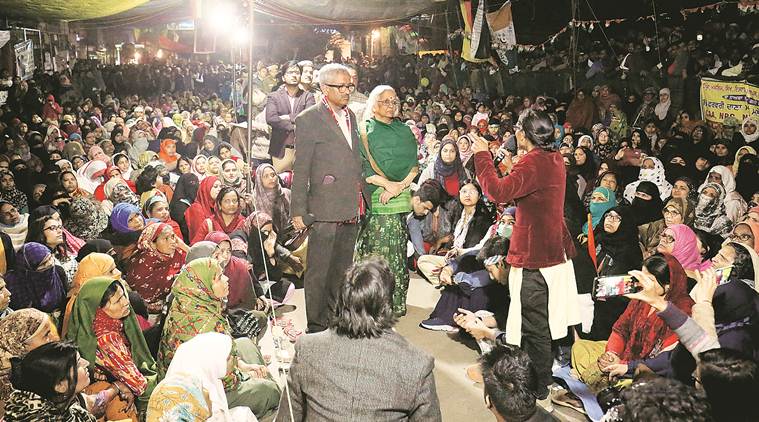 Hegde, Ramachandran listen to protesters at Shaheen Bagh
Hegde, Ramachandran listen to protesters at Shaheen Bagh
Interlocutors tasked by the Supreme Court to talk to anti-CAA protesters occupying a public road in Shaheen Bagh Monday submitted a report in a “sealed cover” to the Supreme Court which said it will peruse the same before hearing the matter on February 26.
Senior advocate Sanjay Hegde and advocate Sadhana Ramachandran submitted their report to a bench of Justices S K Kaul and K M Joseph. The report has neither been taken on record by the bench nor made available to any of the lawyers. When a petitioner sought a copy of the report, the bench said that they were keeping it confidential for the time being, as “the purpose of an interlocutor is different. their report is only for our record”.
Hearing
PILs by advocate Amit Sahni and Delhi BJP leader Nand Kishore Garg, which claimed that the continuing protests in Shaheen Bagh and consequent blockage of roads was causing difficulties to people in neighbouring areas, the SC had on February 17 expressed concern over public roads being blocked by the protesters and deputed Hegde and Ramachandran to discuss with them to find a solution.
Though a counsel appearing for the protesters sought to attribute the traffic disruptions to the police closing alternate routes, the court had said that “if everybody starts blocking roads and entering public spaces, may be for genuine causes, where does it end?”
The report submitted by the interlocutors, it is learnt, is based on the daily updates of their interaction put up for the media by the two interlocutors and a broad compilation of the demands of the protesters. The issues raised by the report will have to be considered by the bench while arriving at a decision. Ramachandran had expressed her thanks to the bench for providing the opportunity, stating that it was a “learning experience”.
The presence of the two interlocutors helped to “calm temperatures in the area” and the protesters, while adamant on the reasons fundamental to the sit-in, slowly agreed to the need for clearing at least one carriageway of the GD Birla Road on the Shaheen Bagh stretch. The court will need to explore this proposal which is contingent on security measures for those in the sit-in protest at Shaheen Bagh. The protesters had earlier told the interlocutors that they needed a guarantee against the repetition of incidents like those in Jamia on January 30 and then in Shaheen Bagh of gun-wielding intruders, and the Court should fix the responsibility of relevant agencies and police for the same.
Among the most important points the protesters have emphasised to the interlocutors are the importance of the reason of their protests, their grievance against the CAA and the prospect of a discriminatory National Register of Citizens to follow the NPR.
The protesters have asked for a look into the deeper causes for the sit-in, and an SIT to enquire into all cases of police brutality, especially in universities like Jamia Millia Islamia, AMU and JNU. They have demanded that all notices served to protesters and warrants to be withdrawn, and action should be taken against elected state representatives issuing hate speeches. A key demand of the protesters, which they told the interlocutors, is to stop all NPR activity in Delhi.
The interlocutors are understood to have made it clear that the court is to decide their role in the coming days. On Wednesday, the court will likely take a call on the extent to which the administration is to be involved in the larger resolution of this vexed issue, considering that the CAA issue is to be heard only much later in March.
Sahni had earlier approached the High Court against the blockade caused by the protests but the HC disposed it, asking police to look into it.
In his appeal, Sahni sought to know “whether the protesters have unrestricted rights under Article 19 of the Constitution of India to protest on a busy road in violation of other persons’ right to have a thoroughfare and whether such protests can be permitted to continue, especially when a particular road is blocked for over a month”.